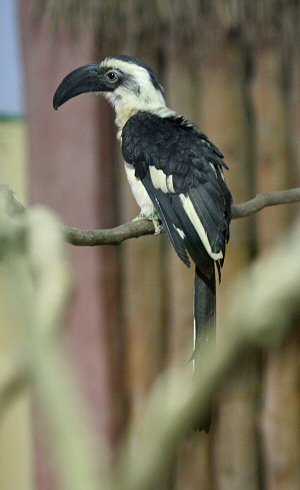Von der Decken's Hornbill Facts

Name: Von der Decken's Hornbill
 Scientific Name: Tockus deckeni
Scientific Name: Tockus deckeni
African Names: Fimbi wa Decken (Swahili)
Length: 17 to 20 inches long
Average Adult Weight: 4 to 6 ounces
Life Span: about 10 years in the wild, 20 years in captivity
Description: The Von der Decken’s hornbill has mainly white plumage on its body with black wings and a black tail. The male has a red and ivory two-tone bill while the female has a black bill. Their long bill allows them to forage and collect food from branches. They have short, broad, and rounded wings which are efficient for short intervals of flight.
Habitat: Von der Decken's Hornbill prefers the open bush and scrubby woodlands of the dry savanna and arid steppe.
Countries found in: Von der Decken's Hornbill is found east of the Rift Valley, from Ethiopia south through Kenya to Tanzania.
Babies: The female lays two to three white eggs in a tree hole. She then seals herself in with the eggs by blocking off the hole with a type of cement consisting of mud, droppings and fruit pulp. A small opening is left for the male to bring food tp the mother and her chicks.
Food: Von der Decken's Hornbill is an omnivorous bird eating insects, snails, mice, nestling birds, lizards, tree frogs, fruit, berries and seeds.
Group Name: Flock
Habits: Von der Decken's Hornbill form monogamous pairs and nest in natural cavities in trees.
Conservation Status: Least Concern for extinction
Predators: Monkeys and snakes
Interesting Facts: Von der Decken's Hornbills have a mutual pertnership with Dwarf Mongooses. They forage together and warn each other of approaching predators.
 Scientific Name: Tockus deckeni
Scientific Name: Tockus deckeniAfrican Names: Fimbi wa Decken (Swahili)
Length: 17 to 20 inches long
Average Adult Weight: 4 to 6 ounces
Life Span: about 10 years in the wild, 20 years in captivity
Description: The Von der Decken’s hornbill has mainly white plumage on its body with black wings and a black tail. The male has a red and ivory two-tone bill while the female has a black bill. Their long bill allows them to forage and collect food from branches. They have short, broad, and rounded wings which are efficient for short intervals of flight.
Habitat: Von der Decken's Hornbill prefers the open bush and scrubby woodlands of the dry savanna and arid steppe.
Countries found in: Von der Decken's Hornbill is found east of the Rift Valley, from Ethiopia south through Kenya to Tanzania.
Babies: The female lays two to three white eggs in a tree hole. She then seals herself in with the eggs by blocking off the hole with a type of cement consisting of mud, droppings and fruit pulp. A small opening is left for the male to bring food tp the mother and her chicks.
Food: Von der Decken's Hornbill is an omnivorous bird eating insects, snails, mice, nestling birds, lizards, tree frogs, fruit, berries and seeds.
Group Name: Flock
Habits: Von der Decken's Hornbill form monogamous pairs and nest in natural cavities in trees.
Conservation Status: Least Concern for extinction
Predators: Monkeys and snakes
Interesting Facts: Von der Decken's Hornbills have a mutual pertnership with Dwarf Mongooses. They forage together and warn each other of approaching predators.
This site needs an editor - click to learn more!
You Should Also Read:
Wattled Crane Facts
Saddle-Billed Stork Facts
Marabou Stork Facts
Related Articles
Editor's Picks Articles
Top Ten Articles
Previous Features
Site Map
Content copyright © 2023 by Jeanne Egbosiuba Ukwendu. All rights reserved.
This content was written by Jeanne Egbosiuba Ukwendu. If you wish to use this content in any manner, you need written permission. Contact
BellaOnline Administration
for details.


